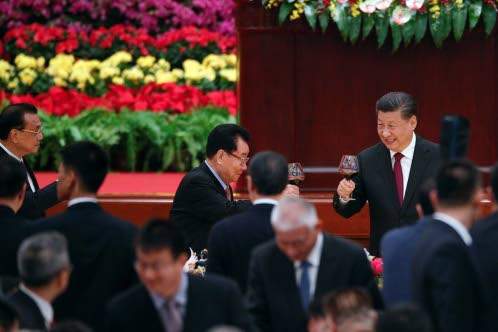Chinese President Xi Jinping (rear right) makes a toast with officials after delivering his speech at a dinner marking the 70th anniversary of the founding of the People’s Republic of China, at the Great Hall of the People in Beijing, yesterday. Xi renewed his government’s commitment to allowing Hong Kong to manage its own affairs amid continuing anti-government protests in the semi-autonomous Chinese territory. (Photo: AP)
BEIJING, China (CMC) – China has no interest in imposing its development model on other nations, like those in the Caribbean for which it provides aid, but it does believe it can offer lessons for those countries, according to a Ministry of Foreign Affairs official.
Addressing foreign journalists gathered in Beijing for celebrations to mark the 70th anniversary of the founding of the People’s Republic of China, director general of the Information Department of the Ministry of Foreign Affairs, Hua Chunying said the Asian nation “will never be as keen as some countries to engage in ideological export or model replication”.
President of the China Public Diplomacy Association, Wu Hailong further sought to assure that “no matter how much China develops, we will not pose a threat to others”.
Chunying, addressing a media forum of developing countries under the theme, ‘China in My Eyes: 70 Years of Impressions and Reflections’, said that the country’s achievements over the past seven decades demonstrate what is possible for all developing nations.
China, despite being the world’s second-largest economy, is still not classified as a developed nation. The World Bank defines a high-income country – or developed country — by setting the threshold for gross national income (GNI) per capita at US$12,055, but China’s GNI per capita, although steadily rising, remains below that threshold, at US$9,470 in 2018.
Chunying said China had accomplished what developed countries have done for hundreds of years.
“China has moved from being closed and backward to being open and making progress…and from being poor and weak to leading a moderately prosperous life,” she said, noting that 850 million people have been lifted out of poverty and hundreds of millions of people have entered the middle-income group.
“China has…expanded the path for developing countries to achieve modernisation, and enriched the dreams of people around the world for a better life. Over the past 70 years China has…become a major driver of global development and an important stabilizer of international peace,” the foreign ministry spokesperson stressed, adding that this was a result of the hard work, wisdom and courage of the Chinese people.
In the process, she added, China was willing to strengthen exchanges and learning with other countries, and to assist in their development. That, she said, was coming with no strings attached.
“We will never be as keen as some countries to engage in ideological export or model replication, because we believe that people of all countries have the wisdom and ability to find a development path that best suits their respective national conditions, live a better and better life, and enjoy their due dignity and rights,” Chunying said.
“We are all developing countries. China’s development is the strength of developing countries. The more developed China is, the more capable it will be of helping developing countries achieve common development, upholding fairness and justice for them, and safeguarding their common interests.”
Both Chunying and former Ambassador to Mali and Morocco Cheng Tao lamented that despite China’s development, some countries refused to acknowledge its progress.
“Some people in some countries seem to have a tendency – as long as it is led by the communist party of China, as long as it is from China or from a socialist country, it must be wrong and must be opposed,” added Chunying.
“What these people may not understand is that real harmony is based on a deep understanding and respect for being different. The world is diverse and colourful. Each flower has its own unique beauty; no matter what kind of system or model – as long as it is in line with the national conditions, as long as it is supported by its people, as long as it can make its own country constantly move towards light and progress, as long as it can make its people live a better life – it is in line with the interests of the country, the right choice.
“A country that cannot accept and tolerate the achievements and progress of other countries, but always suspects others of stealing the axe, or even doing everything possible to suppress it, will not be popular or welcomed.”
A similar view was expressed by another diplomat, former ambassador to Equatorial Guinea, Uruguay, Costa Rica and Colombia, Wang Xiaoyuan. He said some nations wanted to contain the development of other nations through sanctions and trade wars, but stressed that “development cannot be stopped”.
Despite Xiaoyuan indicating he would not name any particular country, his comments were a clear reference to the United States, which is currently engaged in a trade war with China.




Leave A Comment